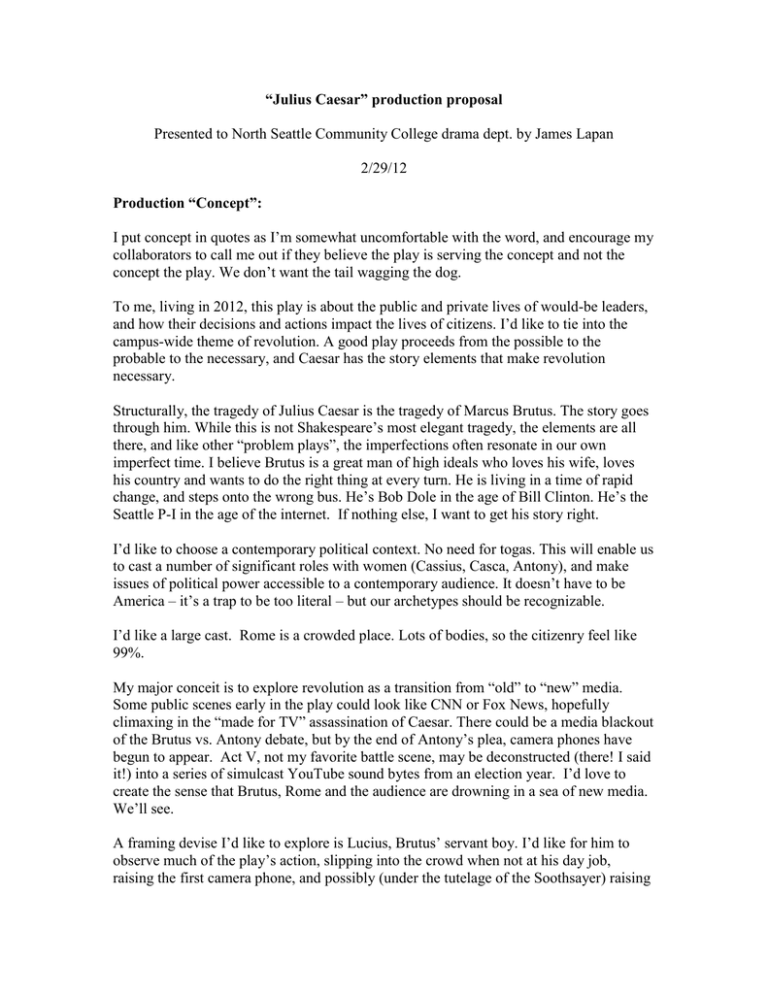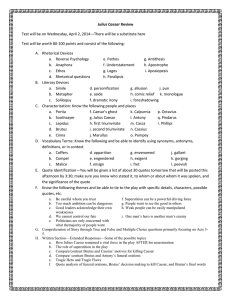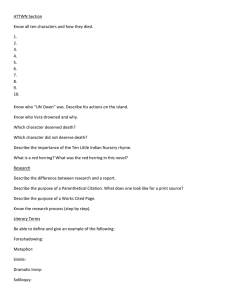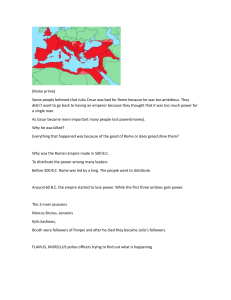“Julius Caesar” production proposal Production “Concept”:
advertisement

“Julius Caesar” production proposal Presented to North Seattle Community College drama dept. by James Lapan 2/29/12 Production “Concept”: I put concept in quotes as I’m somewhat uncomfortable with the word, and encourage my collaborators to call me out if they believe the play is serving the concept and not the concept the play. We don’t want the tail wagging the dog. To me, living in 2012, this play is about the public and private lives of would-be leaders, and how their decisions and actions impact the lives of citizens. I’d like to tie into the campus-wide theme of revolution. A good play proceeds from the possible to the probable to the necessary, and Caesar has the story elements that make revolution necessary. Structurally, the tragedy of Julius Caesar is the tragedy of Marcus Brutus. The story goes through him. While this is not Shakespeare’s most elegant tragedy, the elements are all there, and like other “problem plays”, the imperfections often resonate in our own imperfect time. I believe Brutus is a great man of high ideals who loves his wife, loves his country and wants to do the right thing at every turn. He is living in a time of rapid change, and steps onto the wrong bus. He’s Bob Dole in the age of Bill Clinton. He’s the Seattle P-I in the age of the internet. If nothing else, I want to get his story right. I’d like to choose a contemporary political context. No need for togas. This will enable us to cast a number of significant roles with women (Cassius, Casca, Antony), and make issues of political power accessible to a contemporary audience. It doesn’t have to be America – it’s a trap to be too literal – but our archetypes should be recognizable. I’d like a large cast. Rome is a crowded place. Lots of bodies, so the citizenry feel like 99%. My major conceit is to explore revolution as a transition from “old” to “new” media. Some public scenes early in the play could look like CNN or Fox News, hopefully climaxing in the “made for TV” assassination of Caesar. There could be a media blackout of the Brutus vs. Antony debate, but by the end of Antony’s plea, camera phones have begun to appear. Act V, not my favorite battle scene, may be deconstructed (there! I said it!) into a series of simulcast YouTube sound bytes from an election year. I’d love to create the sense that Brutus, Rome and the audience are drowning in a sea of new media. We’ll see. A framing devise I’d like to explore is Lucius, Brutus’ servant boy. I’d like for him to observe much of the play’s action, slipping into the crowd when not at his day job, raising the first camera phone, and possibly (under the tutelage of the Soothsayer) raising a hand written cardboard sign at play’s end with the word “occupy”. Only if it appears necessary. Character Models: Caesar – impossibly arrogant, impossibly brilliant, eminently electable. Has the common touch. Bill Clinton. Jack Kennedy. Brutus – a genuinely good man, not without ambition, whose time has passed. Bob Dole. Jimmy Carter. Slade Gordan. Cassius – Brilliant but completely unelectable, rash, shrewd, the perfect “inside the belt” power broker. Arianna Huffington. Karl Rove. Antony – Ivy League but willing to take low status to get what they want. When the lights come on, a brilliant speaker. Barak Obama. Clinton again. Soothsayer – man or women on corner with sign. Plebeians – the unemployed or underemployed. People in bars. The 99%. Other archetypes and models should arise from actual research. Our Set: The classic coliseum steps seem hard to avoid, and wouldn’t be out of place in a contemporary context. What could be more public? It would be nice to have a couple private settings – one on each side? – for Caesar’s home, Brutus’ home, the tent and other more private scenes. If we’re able to use video, integrating a screen or screens into the set is always a challenge. Dan? Our Costumes: I’d like the politicos people to look like Washington people and the real people to look like real people, with character appropriate exceptions and variations. I would also consider neutral dress. Our Lighting: No special thoughts on this matter as of yet. I’d like to be able to see the actors. Our Props: There’s a pretty big risk of “talking head” syndrome in this play. While the action is rhetorically strong, we’ll be using rehearsal to discover scene-by-scene events with a focus on the ‘reality of doing” wherever possible. Props can be of use here, though invariably less is more. I’ll be encouraging the actors to use personal objects. Video Elements: I make no claim to be good at multi-media, so our production team may need someone who is. This could well be a student. The assassination of Caesar, and other early scenes, may be prerecorded and broadcast as polished network style news segments. I’d like to suggest a media blackout during the great debate in the middle of the play. If possible, the last third of our production could be a montage of live action, You Tube video, and cell phone reporting. Can a scene be played and broadcast simultaneously on our stage? Script adaptation: Yes, there will be cuts, primarily for the sake of flow and clarity, but the script should sound familiar until act V, which I’d like to significantly condense and deconstruct. I should probably be given a deadline for this adaptation. Dawson?



